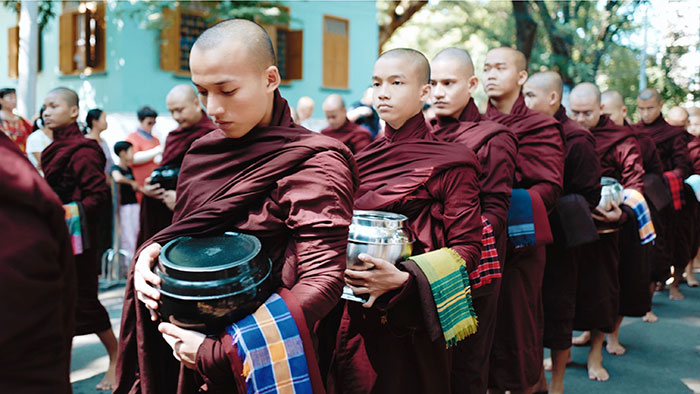
(photo: billow926)
My family is Thai Buddhist, and I was raised that way, so I can at least tell you about what it’s like for us.
The answer is, it depends. It depends on where you are, what kind of temple you’re at, if at all, and how far along you are in your, lets call it, career, as a monk.
There are a few things that are the same, for most monks. Traditionally, you wake up very early, take your offering bowl (which is one of the few possessions that you’re allowed to own) and go from house to house asking for food. Lunch is the same way. We don’t eat dinner since two meals are seen as enough to sustain you, especially since as a monk you aren’t engaged in hard labor. This is one aspect of the Middle Path, where eating too little (malnutrition) and eating too much (gluttony) are both distractions from you trying to achieve enlightenment.
The rest of your time is spent either learning the Buddha’s teachings (the Dhamma), meditating, or teaching other people Buddhism. That’s the theory, anyway. In practice, it depends.
For example, in the US, there isn’t a tradition of giving food to random monks knocking on your door. So here, the monks live at the temple and people bring the offerings to them. Every week, we’d have a ceremony where people would symbolically put food in the offering bowls, and then give money afterwards to support the temple and the monks. So, just adapting to different circumstances.
Now, about the actual studying Buddhism thing. The whole point of becoming a monk is that you are giving up the material world (wealth, physical pleasure, having kids) in order to focus on attaining enlightenment and breaking out of the cycle of reincarnation. So at the start of your life as a monk, when you’re first ordained, most of your time is going to be spent reading and memorizing the Dhamma. The Buddha never himself wrote down his teachings, so each sect has their own version of what he said, as well as their different interpretations of how to practice. For example, Thai monks are not allowed to drink alcohol, because it clouds the mind and is an earthly pleasure which is distracting you from enlightenment. Japanese Buddhist monks, though, can drink. I’m pretty sure there’s literally millions of differences like that between all the different sects, so remember that when you come across something that contradicts me, like your Indian Buddhist friend telling you I’m 100% wrong about something, that’s probably just cultural or sectarian differences.
Anyway. So, as you progress, you’ll spend less time learning the teachings and more time interpreting them. Senior monks will teach you about what a certain parable means, or the implications of one interpretation or another. You’ll still be doing a lot of meditating, at all points in your career. I would say that 4 hours per day, spread out into increments, is normal. Sometimes a lot more, if you’re in a period when you’re struggling with something, or trying for intense self improvement. Sometimes less, if you’re busy with other duties.
What other duties, you ask? Well, monks don’t get to just hole up and study. They have some things that they give back to the community. There’s rituals and ceremonies that you’ll have to perform. Weddings, funerals, births, sermons, these are all typical things that monks are expected to do. Some of them are a little weird to western standards. For example, whenever a building is being built, the owners will give an offering to the temple for some monks to come and bless it. And there’s loads of random things like that that will take up a monks time.
Remember way up at the top when I talked about where your temple was? So, in rural Thailand, in small villages, often the temple will function as a school. The children will go and, in addition to getting a religious education, they’ll learn to read and write, maybe some basic math or history too.

Theodore Lee is the editor of Caveman Circus. He strives for self-improvement in all areas of his life, except his candy consumption, where he remains a champion gummy worm enthusiast. When not writing about mindfulness or living in integrity, you can find him hiding giant bags of sour patch kids under the bed.
